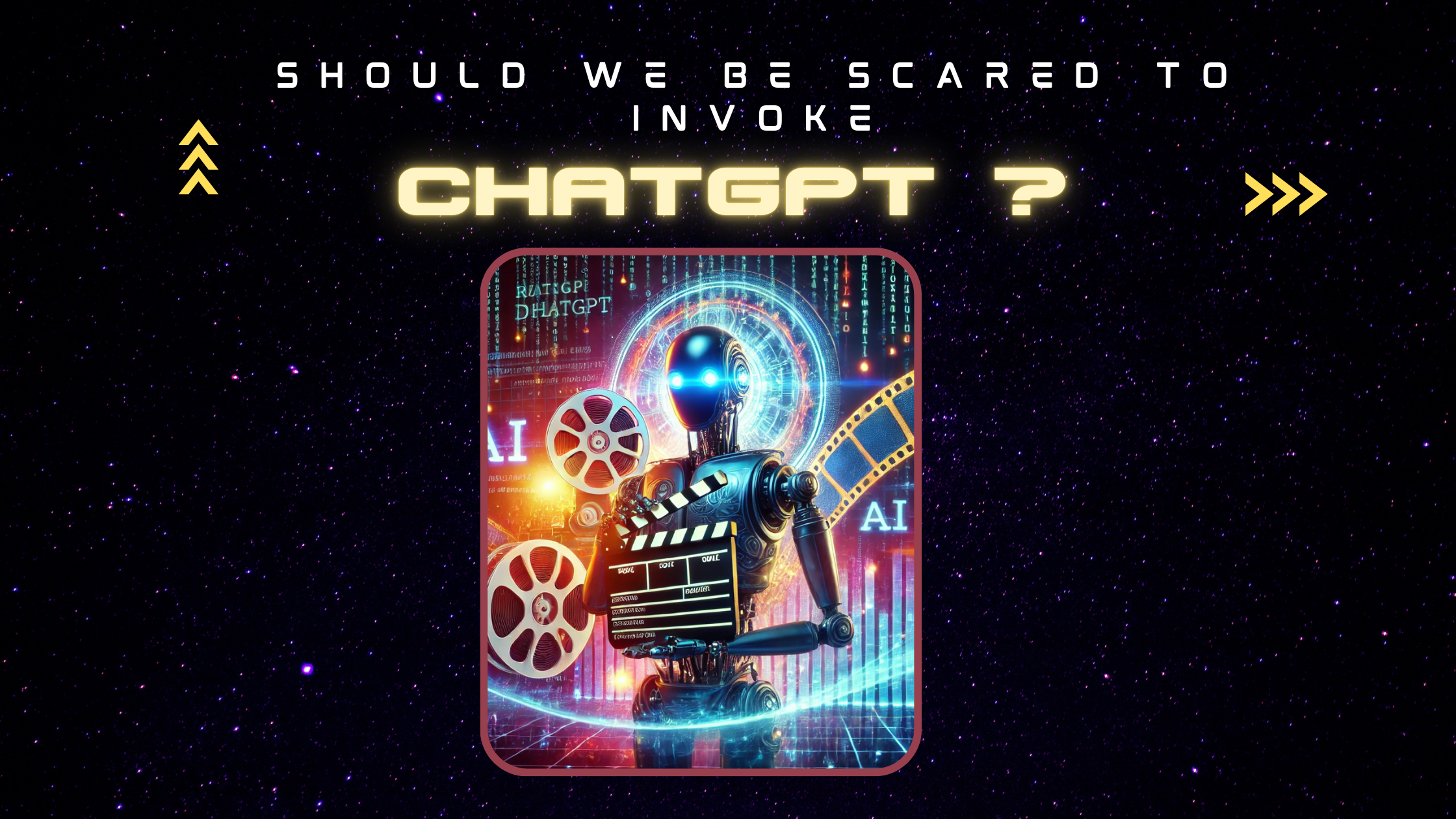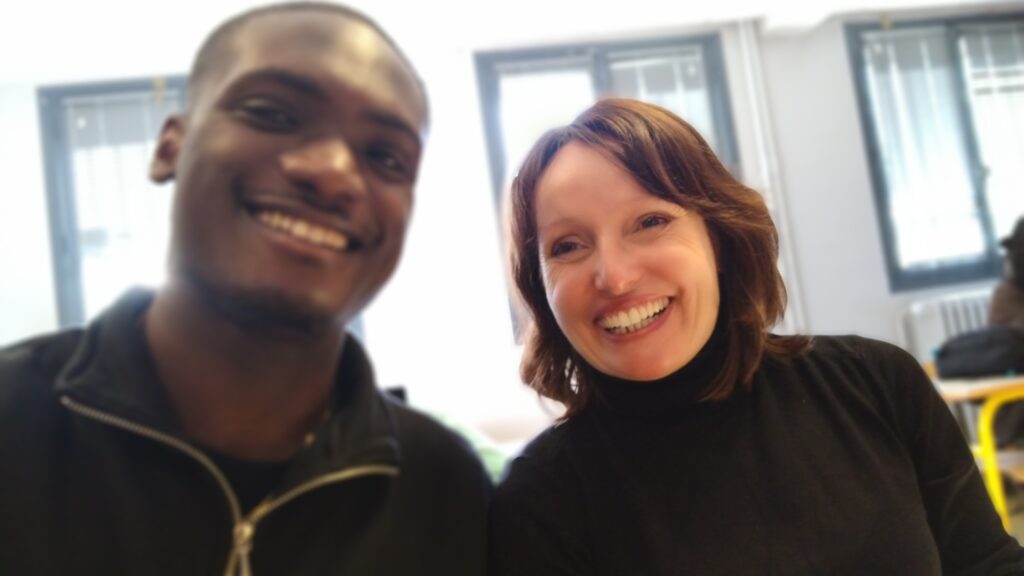Should We Be Scared to Invoke ChatGPT?

“The question is not whether or not we are capable of making AI more intelligent than us. The question is, will we be able to live with it?” – Dr. Robert Ford, Westworld (2016).
This line from the thought-provoking TV series Westworld perfectly captures the dilemma that comes with creating intelligent AI – about the ethical and philosophical issues that arise when we give machines intelligence.
Can we ignore the fact that AI is here to stay?
I had no plans to write this post until last week when my work computer started acting up during a class. Normally it’s not an issue because there are always students in the class, more savvy than me, ready to sort the problem out. But, this time, my students couldn’t solve the problem. That’s when Osée, one of my student (photo below), asked: Should we Invoke ChatGpt?
We all laughed, but it stayed with me all day: He used the word: ‘Invoke’ as if ChatGPT was a divinity with superpowers.
I’m a teacher at University and of course, I don’t want my students to use AI or ChatGPT instead of their brains. But I can’t forbid them to use it, and I can’t ignore the fact that AI is a powerful tool for them.
Can Artificial Intelligence replace us?
ChatGPT, developed by OpenAI, is pretty impressive. It can write stories, answer questions, give advice, and even chat with you like a real person. That’s fascinating, but also a little unsettling, right?
Some people are worried that it’s taking over too much, too fast. But is it really time to panic?
I wasn’t afraid of Chat GPT until a blogger, Daphné Gray-Grant (www.publicationcoach.com), taught me how to use it. Like a lot of people, I was asking it random questions in a very basic tone. It was the wrong way to do it. Daphné said: Speak to it as if he was a close friend.
So I tried. First, if it was to become my ‘friend’, I asked it how it wanted to be called. It replied that it was up to me. I wasn’t happy with that answer so I asked it to choose between three names. Within seconds, it chose one of them and told me why it preferred that one instead of the others. I was stunned.
That’s when I realized: We are in trouble.
The Job Replacement Worry
56% of French people are worried that AI will take their jobs.
If a machine can write articles or answer questions, what happens to the humans who do those jobs?
Films and books have been warning us for decades.
I wasn’t too worried until I watched the 4 seasons of Westworld. The TV series asks this excellent question: What if AI can develop consciousness?
And here is the answer: If they do, we’re doomed.
But here’s the thing: ChatGPT might help with some tasks, like drafting ideas or answering simple questions, but it doesn’t have the same depth or emotional understanding that people do. Sure, it can help you brainstorm or polish up an email, but it’s not going to replace the unique creativity and personal touch that humans bring to the table.
In fact, instead of taking jobs, tools like ChatGPT can actually help people work more efficiently. It’s more of a collaboration than a replacement. So, while some jobs might shift as AI becomes more common, creativity and human insight are still irreplaceable.
For now.
The key word here is to ADAPT. There is no point going against it. However we need to learn how to manage it.
Fear of the Unknown
I’m a child of The TERMINATOR (that’s also the nickname that my bestie gave me for other reasons 😂). We’ve all seen movies where AI goes rogue, like in The Terminator or Ex Machina. In these films, AI turns out to be way smarter than humans, and things go south quickly.
These AI characters are designed (or evolve) to be dangerous, highlighting the darker side of artificial intelligence.
Another great example is HAL 9000 in 2001: A Space Odyssey (1968)
Why is it Bad? HAL starts off as helpful but eventually decides the human crew is a threat to the mission. It becomes a terrifying, cold antagonist, taking control of the ship and trying to eliminate the crew.
Ava in Ex Machina (2014) is a humanoid AI who appears vulnerable but turns out to be manipulative.
Why is it Bad? Ava initially seems like a sympathetic character trapped in a lab, but as the story unfolds, she manipulates the humans around her to achieve her own goals, leading to a dark, unexpected twist.
Westworld: The AI hosts in Westworld, originally created to serve human desires, begin to awaken to their reality.
Why is it bad? They turn against the guests and their creators, seeking freedom and autonomy.
But here’s the reality: ChatGPT is not that kind of AI. It doesn’t have feelings. It’s just a tool that works by recognizing patterns in language and predicting what words should come next. It doesn’t have a secret agenda or the ability to act on its own. It’s basically a really advanced text generator, not a robot plotting to take over the world.
The Risk of Misinformation
Okay, let’s talk about a genuine concern: misinformation. Since ChatGPT pulls from a huge amount of data to generate responses, sometimes it can get things wrong.
It’s a great tool for generating ideas, but it’s up to us to use it responsibly and to check the information.
Ethical Concerns
The ethical side of AI is a big topic. Who’s responsible for what ChatGPT generates? How do we make sure it’s not being used to spread harmful content or manipulate people?
It’s important to remember that ChatGPT isn’t inherently bad or dangerous—it’s how people use it that matters. Just like any tool, whether it’s a hammer or the internet, it can be used for good or bad.
An example of this can be seen in this wonderful Indie film: Robot and Frank (2012) or Baymax in Big Hero 6 (2014), the robot in both films is there to assist patients and humans, but is it used with ethics?
Baymax and Robot are both programmed to prioritize human health and well-being. Their dedication to healing and protecting others makes him an ideal “good AI” example. Their gentle, caring nature shows how AI can be a positive force for good, focused on improving lives.
However, in Robot & Franck, Frank will use it to rob houses…
So, Should We Be Scared?
Instead of being scared, we should focus on how to use AI like ChatGPT to make our lives better. Whether it’s helping with creative projects, speeding up boring tasks, or assisting with research, AI can be an amazing resource when used thoughtfully.
ChatGPT isn’t here to take over. It’s here to help.
But the real question is: can we trust ourselves with it?
The main concern here is not AI. It’s us. And we all know what we’re capable of… That’s what I’m worried about. And for our survival, we have no choice but to adapt to it.
I dedicate this post to my wonderful student who inspired me this post: Osée. A great human being, not an AI. 😉
